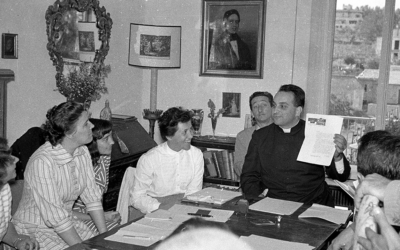
It was the passion, freely embraced, that displayed to God and human beings the love with which Christ loves us, that is, which gives us life. In suffering, he displayed his humanity. In loving us, he displayed his divinity. From then on, the human is always divinized if it transforms pain into love. This is the unheard-of miracle of a God who suffers, from his birth in a cave to a vagabond life, a horrendous death…
The life of Christ, which he taught us and which we must follow if we want to receive grace-filled life, is to live the Gospel welcoming suffering and with it being conformed to him. That means that loving is not all sweetness and delight. The duty of giving even when giving itself gains bitterness, this is loving as Christ has loved us. If someone, when loving, seeks satisfaction, it means that person is thinking of self, loving self. Such a one loves creatures, not for the sake of creatures and still less for God, but for self.
Love is gift and belongs to sacrifice. Love and pain react with one another. The one makes the other more sensitive – always, naturally, if this is a matter of movements guided by divine grace.
How do you intend building projects of stability on the basis of human beings, when their feelings vary from evening to morning, when your moods, and sometimes your vision of life, vary because of something you have eaten or after something you have read or a conversation? In yourself, in your nerves, in your physical changeability, you are unstable. When you need to act perhaps you are tired, when you need sleep perhaps you have insomnia. And you cannot rely upon your natural gifts, on your culture and affections because these vary as well, alternating trust with distrust, light with shade, peace with anger. And neither do other people offer you a basis; in your family perhaps you come up against characters that do not work together with yours, persons whose existences are closed in on themselves or that open up to other kinds of horizons. You come up against rejoicing when you are sad, mockery for your faith, incomprehension of your sacrifices, changeability, inconsistency…
Going out from your family, then, the ground crumbles under your feet. Money can give bread to feed you, but not peace to give you calm. Among your friends there is betrayal and incomprehension: if you are poor, they flee you; if you are rich, they betray you. When you need it, they have neither the strength nor the desire to support you.
And so your life is about thinking at night to seek some support in the day, it is about seeing the day darken hope under the night of disillusionment. And so time passes away.
You will find truth in God alone. He alone is stability, he alone does not pass away. And the throng outside and the phantasmagoria of landscapes and personages that vary, if God exists, neither shock nor enthral you, for you rest anchored in the Eternal. The scene of this world passes away, God remains.
Igino Giordani, Il Fratello (Città Nuova, April 2011, III edizione Figlie della Chiesa, 1954)




0 Comments